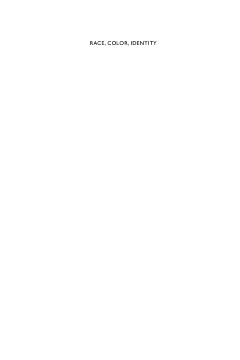
Additional Information
Book Details
Abstract
Advances in genetics are renewing controversies over inherited characteristics, and the discourse around science and technological innovations has taken on racial overtones, such as attributing inherited physiological traits to certain ethnic groups or using DNA testing to determine biological links with ethnic ancestry. This book contributes to the discussion by opening up previously locked concepts of the relation between the terms color, race, and “Jews”, and by engaging with globalism, multiculturalism, hybridity, and diaspora. The contributors—leading scholars in anthropology, sociology, history, literature, and cultural studies—discuss how it is not merely a question of whether Jews are acknowledged to be interracial, but how to address academic and social discourses that continue to place Jews and others in a race/color category.
Efraim Sicher is Professor of Comparative and English Literature at Ben- Gurion University of the Negev, Beer-Sheva, Israel. He has published essays and books on modern Jewish culture, Holocaust memory, and anti-Semitism. His most recent books are The Holocaust Novel (2005), Babel in Context: A Study in Cultural Identity (2012), Rereading the City / Rereading Dickens (2nd edition 2012), and Under Postcolonial Eyes: Figuring the “Jew” in Contemporary British Writing (with Linda Weinhouse, 2012).
“If the reader, after closing this volume, remains uncertain or confused about the fundamental questions related to Jews and race (though not Jews and color), this is because fundamental questions appear to remain unresolved. Overall, the essays do a marvelous job in both illustrating and illuminating this confusion.” · Studies in Contemporary Jewry
“An excellent text that will be a significant contribution to the study of Jews and race… The work approaches the topic from a variety of disciplines and geographic locations, and the breadth is in fact one of its greatest strengths.” · Rebecca Alpert, Temple University
“This is a very fine book… It is a very eclectic collection of essays on a range of related texts and issues, yet the chapters cohere, producing a whole that is greater than the sum of its parts, which is how a collection of essays should be. The subject of the volume is important; and many of the essays are first-rate. All of the chapters are trim and to the point.” · Emily Budick, The Hebrew University of Jerusalem
